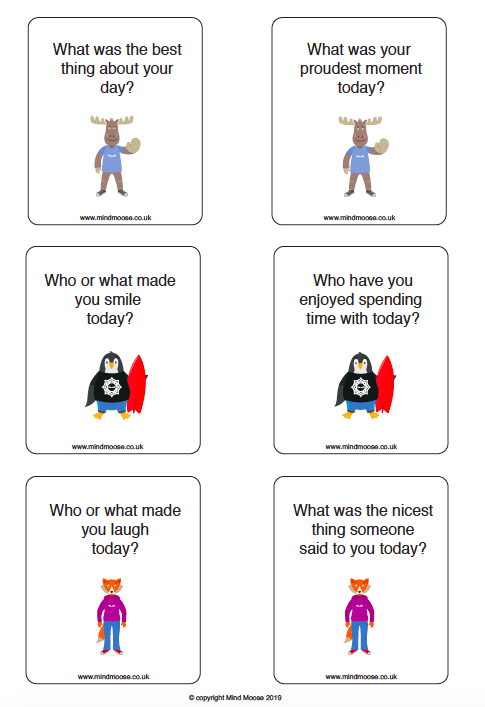Created for Mental Health Awareness Week, 2019 these positive body image cards are designed to be conversation starters to help children think about their bodies in positive ways.
We hope you enjoy using them and find them helpful!
By Zoe Ross
Created for Mental Health Awareness Week, 2019 these positive body image cards are designed to be conversation starters to help children think about their bodies in positive ways.
We hope you enjoy using them and find them helpful!
By Zoe Ross

Next week, many children in primary schools in England will be taking their SATS.
Though many schools, teachers and parents understand that SATS are nothing to be worried about, the unfortunate truth of our ‘achievement culture’ is that there can often be increased levels of SATS stress for some teachers, parents and subsequently children.
Some people judge schools on their SATS results and some schools therefore put pressure on teachers to get as high results as possible, which results in pressure inevitably being applied to children. Parents can also contribute to this at home if they buy in to the results culture.
As children pick up on adult stress very easily, they may feel there are real or perceived expectations about what they ‘should’ achieve and some children may feel anxious about the tests.
Children will rarely say ‘I feel stressed about SATS next week!’. It is very unlikely a child will recognise and tell you they are stressed! Instead they are mostly likely to show you through behaviour and emotional cues, though they may, if you are lucky, talk to you about their worries.
However, other signs you may notice are :
1.They may be unusually moody, angry or withdrawn, they may complain, cry or find it difficult to sleep (or sleep a lot) or have nightmares, their appetite might seem better or worse than usual.
2. Negative changes in behaviour are a real cue that something is wrong. If a usually happy, chilled out child becomes angry, withdrawn, or upset then it’s worth taking the time to chat to them and explore further.
3. Stress can often shows itself in physical ways. Complaints of tummy aches or upsets, feeling sick or headaches are a classic sign.Some children cannot explain how they feel ill, they just do. In a busy world with work/appointments to get to it can be frustrating for a parent not to have something to “put their finger on”. A hug (if they allow it) and a chat might sometimes be all that is needed.
4. Sometimes when feeling under stress children can find it difficult to make even , what seems like, the simplest of decisions. They might be appearing to dawdle over what to wear, what book to choose, what snack they want. If this is unusual for them it is sometimes helpful to reduce the number of options or guide them more than they might normally need.
5. Your child may start to talk negatively about school or people in it. There may be more reports of falling outs with friends. If this is unusual it is likely to be due to the immediate stressful situation but keep listening to what your child says and take note in case it escalates or is prolonged. As always talk to your childs teacher if you have any concerns.Remain loving and supportive and maybe try some of the ideas listed below to help.
So, there are 8 ideas that you can try to help your child to manage SATS stress, if they are feeling anxious. You know your child better than anyone so adapt them and use your own as required. If you have significant concerns about your child’s level of stress and it does not improve /or continues to worsen after the SATS have finished, consider seeking advice from your GP and do talk to your child’s teacher.
By Zoe Ross

These family conversation cards are designed to help you talk to your child in a positive way about your day.
On the first page there are suggestions for how to use them. You just need to print them out, cut them up and give them a go!
You might also like this post on 10 ways to support your child’s mental health and wellbeing.
© copyright Mind Moose 2019
By Zoe Ross
This post gives you 10 practical ways as a parent to support your child’s mental health and wellbeing.
It’s Children’s Mental Health Week this week and there are loads of great resources for schools from Place2Be and the Anna Freud Centre for Children and Families (and from us from the last 2 years here!).
However, families and parents are vitally important in helping children to develop and maintain good mental health and wellbeing. It can be tricky to know where to start, though, so these 10 tips should help.
Although they are ‘easy’, we recognise that being a parent is rarely easy, however hopefully there is at least one tip that you can try with your child to get started.
Good luck!
1. Show them you love them – hug them (if they will let you!). If they don’t like hugs, how about a high five or a special handshake for just the two of you?
2. Try to create a home environment where they know they are safe to be themselves – whoever they are. Accept them as they are and don’t try to force them to be something they are not.
3. Take a genuine interest in the activities and things they love (not what you would like them to love). If they love american football, learn about it so you can chat to them about their interest – get them to teach you!
4. Tell them that you recognise their strengths and show them you notice when they do the right thing (e.g. ‘I saw you helping David with the baby. Thank you, that was such a kind way to behave and so helpful’).
5. Make time and space for your child and give them your full attention. A little bit of undivided attention and active listening every day is great. Turn off your phone and really listen to them. A car journey or walk where you are side-by-side can be more fruitful than a face-to-face interrogation! Our family conversation cards can help get you chatting.
6. Show them that everyone is human and makes mistakes. By doing so you can model effective ways to deal with difficult situations (e.g. calming down, saying you are sorry, explaining that you recognise you made a mistake and what you’ll do to make sure it doesn’t happen again). They will learn from you that it’s okay to make mistakes and healthy ways to deal with it.
7. Make sure your child knows the family boundaries and what the consequences are if they cross the line. It’s not the severity of the consequences that is necessarily important, but the fact they know there are clear boundaries and you will follow through. This helps them to feel safe and secure.
8. Encourage talking about emotions and mental health. This need not be scary or ‘touchy feely’ if that makes you uncomfortable. Simply sharing your day and how things made you feel is a great start. E.g. ‘I felt really angry earlier today because I got a parking ticket and I mistakenly thought I was parked legally.’ is a good start!
9. Help your children to set and achieve goals. Perhaps they’d like to run (or walk) a mile. You can help them to do it and show them how to break their goal down into manageable sections. This is a really helpful life skill and very good for wellbeing.
10. Show children it’s important to take care of your physical and mental health. Model good habits to them (e.g. “I can feel myself getting a bit wound up about that parking ticket again, so I’m going to have a walk / bath (or both!) to calm myself down!”).
Good luck!
Do contact us at support@mindmoose.co.uk if you’d like to try Mind Moose to build a positive relationship with your child and support their mental health (or if you’re lucky, your school has already signed up, so speak to them about how you can get involved too!).
PS. You can download a printable PDF of this guide by clicking the box below if you are a parent, or a school that would like to share it with parents.
By Zoe Ross
Our last free relaxing body-scan meditation was so popular we thought we’d produce another one for you!
This short, guided kindness meditation encourages children to feel kindness towards themselves and others.
It is only 3 1/2 minutes long and is suitable for use with most children of around the age of 7 and above.
It’s a really gentle introduction to loving kindness meditation, which has been shown to increase positive emotions, feelings of empathy and general wellbeing.
This type of meditation helps children to think good thoughts about themselves and others, helping to introduce them to the idea that giving and receiving kindness is a positive experience.
Depending on the child(ren) you are using it with, you might like to talk through the ideas beforehand if necessary (for example thinking good things about themselves and others). This will help them to get the most out of the meditation.
We hope you enjoy!
You might also like the kindness resources we produced for Children’s Mental Health Week earlier in the year.